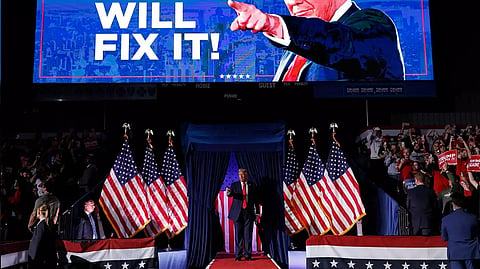
- NEWS
- the EDIT
- COMMENTARY
- BUSINESS
- LIFE
- SHOW
- ACTION
- GLOBAL GOALS
- SNAPS
- DYARYO TIRADA
- MORE

Investments in debt instruments issued by emerging markets (EM) like the Philippines might remain stable this year while funds for equities might slow amid analysts’ projections of a stronger US dollar and high global inflation under the returning Trump presidency, the Institute of International Finance (IIF) reported.
“As global monetary policy remains a central focus, concerns over the dollar’s strength relative to EM currencies have amplified risk aversion in equity markets,” IIF economist Jonathan Fortun said in his special report released Friday.
He said investors already expressed optimism on the US equity market in October as EM posted a total outflow of $25.5 billion, the largest this year based on IIF data.
Meanwhile, Fortun said the EM’s net inflow from debt investments remained “resilient” at $27.4 billion.
Due to the stronger demand for US stocks, he shared that the US dollar appreciated by three percent after initial election results on 6 November showed a Trump victory.
Pressure on EM currencies
The reelected American president will be inaugurated into office on 20 January 2025. “This has added pressure on EM currencies and the euro, though the reactions have been more muted compared to 2016,” Fortun said.
US firms are seen to boost production and create more innovative goods and services through Trump’s promised lower corporate taxes of 15 percent from 21 percent.
“Trump’s administration is anticipated to implement sector-specific incentives focused on manufacturing, technology, defense and infrastructure,” Fortun said.
“These targeted tax policies are designed to attract business investment by lowering the financial burden on corporations and increasing after-tax profitability,” he added.
Long-term risks
However, Fortun said the US government might increase borrowings from other countries to compensate for losses from corporate tax cuts to support its infrastructure projects.
He added that US economic growth might slow down in the long run as inflation rates rise due to possible labor shortage from Trump’s anti-immigrant policies.
“Labor availability in sectors like agriculture, construction, and healthcare could be affected, likely driving up wages. Although rising wages may initially support consumer spending, prolonged labor constraints could ultimately elevate operational costs,” Fortun said.
Despite global economic uncertainties, the Philippines posted manageable inflation of 3.3 percent from January to October based on data from the Philippine Statistics Authority.
